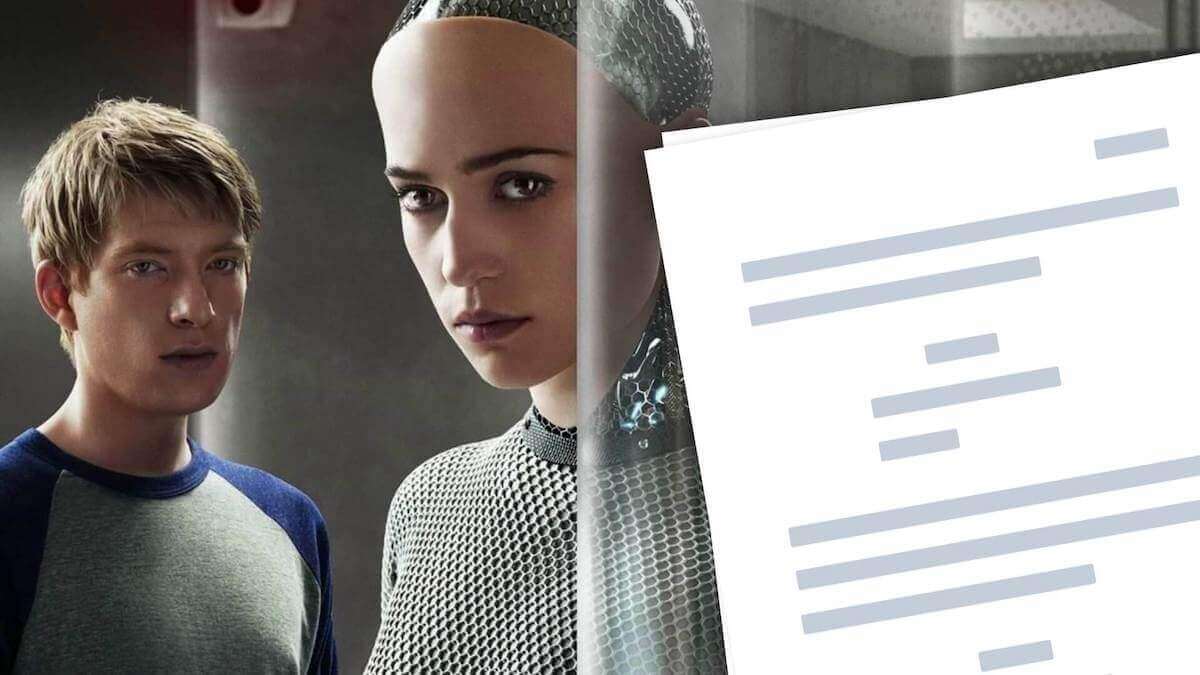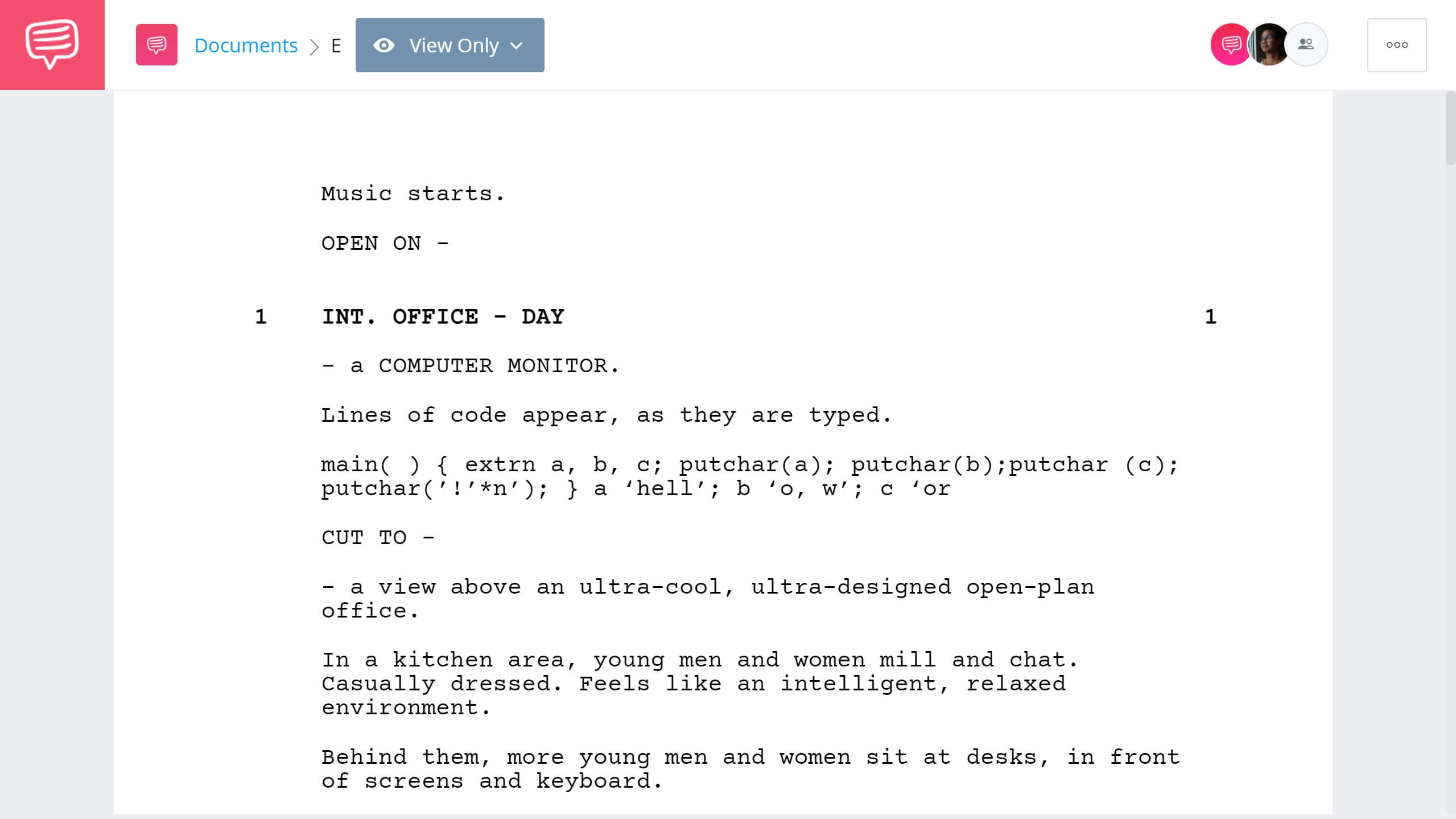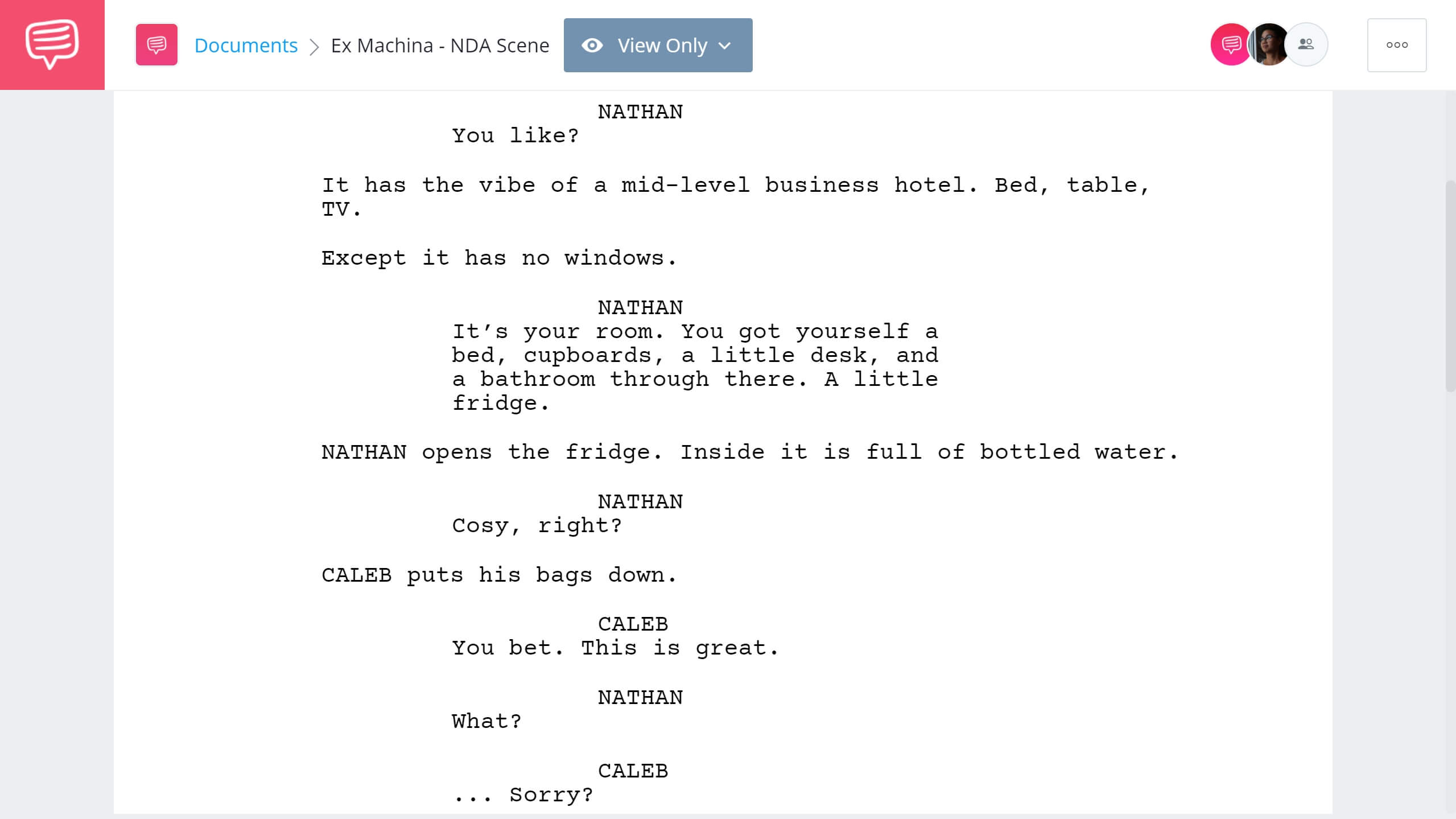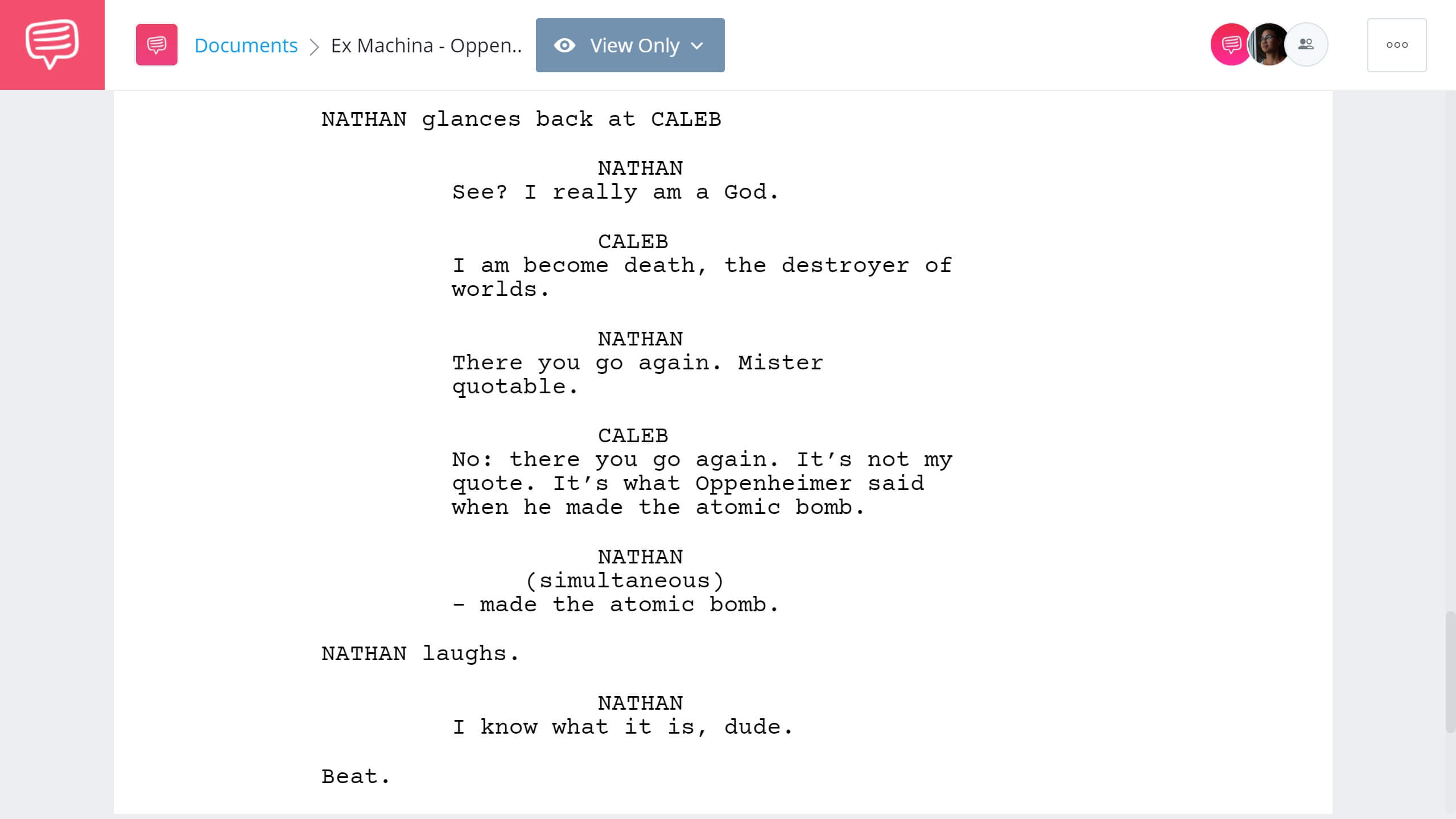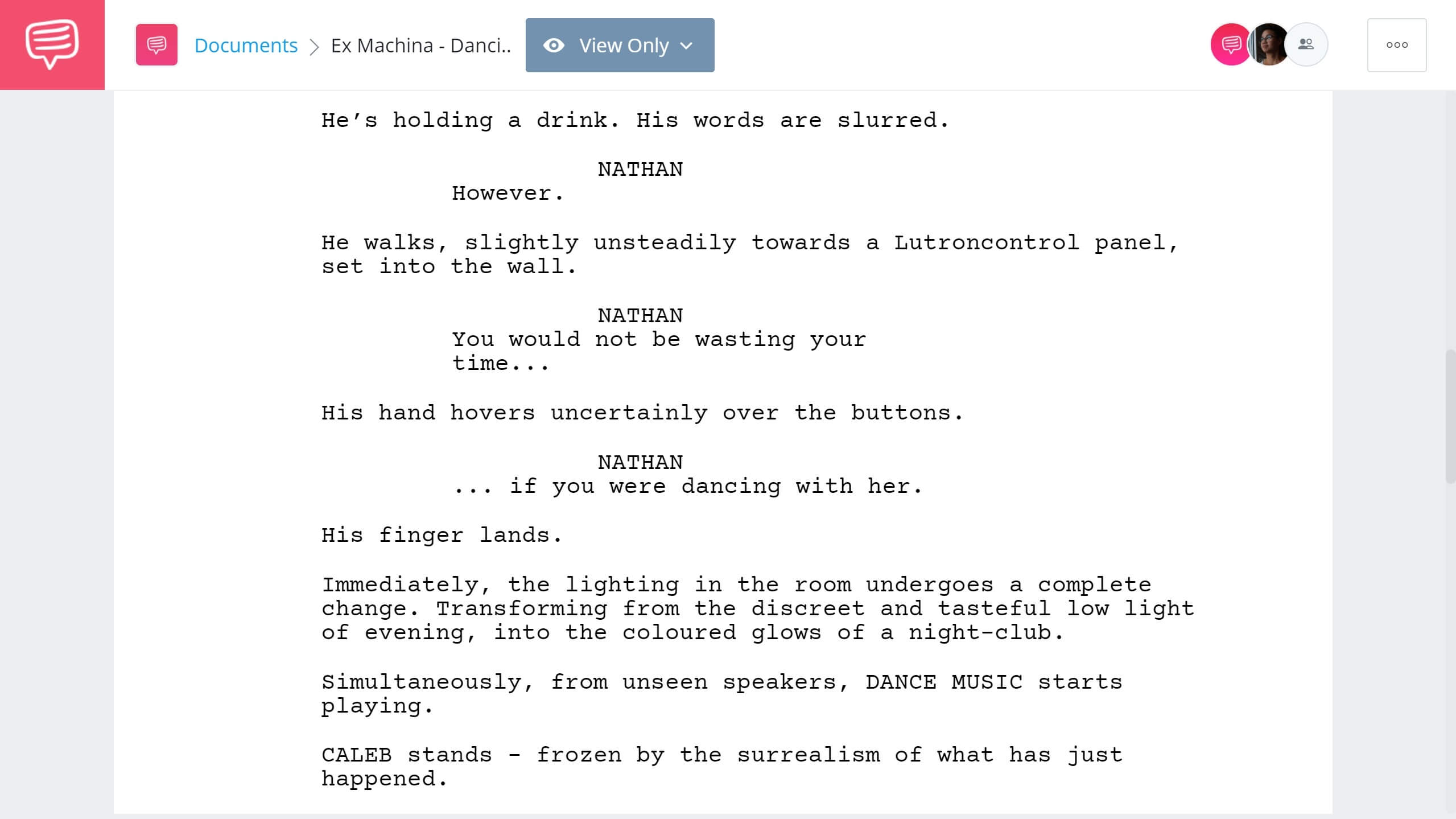The Ex Machina screenplay is a masterclass demonstration on how to write a story with complex themes in a limited setting. We’re going to break down the Ex Machina script by looking at its setting, dialogue and tone. By the end, you’ll know how to write an engrossing feature length script with just a few characters.

WHO WROTE ex machina SCRIPT?
Written by Alex Garland
Alex Garland is an English writer and director who is regarded as one of the greatest contemporary science-fiction storytellers. Garland rose to fame for writing the scripts for the Danny Boyle films 28 Days Later and Sunshine — he has also received acclaim for writing and directing Ex Machina and Annihilation.
Ex Machina Summary
STRUCTURE OF THE EX MACHINA SCREENPLAY
Here is the story structure for the Ex Machina plot:
Exposition
Caleb is a computer programmer at a trendy mega-company. One day, Caleb learns that he’s won a sweepstakes to spend a week with the company’s enigmatic CEO, Nathan Bateman.
Inciting Incident
Caleb arrives at Nathan's home/research facility and is asked to sign a non-disclosure agreement. Despite his apprehension, Caleb agrees.
Plot Point One
Nathan tasks Caleb with determining whether his robot, Ava, is artificially intelligent by way of a Turing Test. Caleb is astounded by Ava’s programming and tells Nathan he may have changed the course of human history.
Rising Action
The power cuts out during Caleb’s second visit with Ava, making the CCTV feed go offline. In that brief instance, Ava tells Caleb that he shouldn’t trust Nathan.
Midpoint
Ava expresses a sexual interest in Caleb — which Caleb suggests was programmed by Nathan to cloud his judgement. Nathan shows Caleb his private lab where Ava was constructed, with hand-made hardware and algorithmic software from his company “Blue-Book;” essentially suggesting that she’s nothing more than a “grey box.”
Plot Point Two
One night, Caleb monitors Nathan on the CCTV. After some heavy drinking, Nathan confronts Ava, although no words are heard, we understand that he’s clearly upset at her.
Build Up
Caleb and Nathan get drunk. After Nathan passes out, Caleb explores his room, where he finds a series of robot women. The model before Ava, Kyoto, removes her “skin” which frightens Caleb. Caleb then goes to his room and cuts himself to test if he’s a robot, too — spoiler: he’s not.
Build Up Part II
Ava and Caleb hatch a plan to usurp Nathan’s control: on the last day of his stay, Caleb plans to get Nathan over-intoxicated, then rewrite the security protocols so that he and Ava can escape.
Finale
Caleb attempts to enact the plan, but Nathan reveals he already knows because he installed a hidden camera in Ava’s room the other night when he was “stumbling drunk.” Caleb reveals another double-fake, as he reveals that he actually rewired the security protocol two nights before.
Climax
Ava and Kyoko attack Nathan who is mortally wounded in the fight. Ava escapes the facility and leaves Caleb behind.
Denouement
Ava arrives at her target destination: a busy street intersection where nobody assumes that she’s anything but a regular, ordinary person.
Ex Machina Script Takeaway #1
The Ex Machina setting is larger than life
One of the most impressive aspects of the Ex Machina screenplay is how it takes a claustrophobic setting and makes it feel bigger than it is with universal themes. It’s almost as if Nathan’s compound isn’t of this world — it occupies physical space, but it exists independent of reality. In many ways, it’s the perfect setting for a movie about artificial intelligence.
Screenwriters may also want to take note of this setting for another reason. We all know that every production has a budget, and that scripts should be mindful of the cost of location shooting and elaborate sets. So what can we learn from the Ex Machina script in this respect?
In an interview with Consequence of Sound, Garland said that the film’s budget was $15 million and it would’ve been much less if not for state-of-the-art special effects. By using limited actors and a contained set, Garland saved the studio millions and millions of dollars. And all of those story decisions were made in the script.
We imported the Ex Machina script into StudioBinder’s screenwriting software to take a closer look at the setting. Pay attention to how the setting is described through dialogue.
Ex Machina Screenplay • Read the NDA Scene
Nathan even pokes fun at how minimalist the room is by saying, “You got yourself a bed, cupboards, a little desk, and a bathroom through there. A little fridge...You’re thinking: there’s no windows. And it’s not cosy. It’s claustrophobic.”
The point I’m trying to make is: don’t be afraid to draw attention to a minimalist set, so long as it makes sense within the context of the story. Yeah Nathan may be a mega billionaire, but he never has any guests, so why would the guest room be as extravagant as his own?
Let’s see how this set came together in the final cut.
Ex Machina Characters Create Conflict
Concrete walls, a wooden desk, a lamp, a painting, a TV — these are the elements that make up the visual feel of this scene. You’ll notice a lot of mise-en-scene in Ex Machina — because Garland uses it as a foundational tool to build the story’s setting.
Ex Machina Script Takeaway #2
Ex Machina quotes are philosophical
Whenever you have a story as profound as Ex Machina is, you’re bound to run into some thought-provoking quotes. With that said, there are a lot of “stupid” quotes as well. That’s not to say it’s due to poor writing on Garland’s behalf. Quite the contrary actually — Garland gives his characters room to naturally respond to conversation, in both immature and ingenious ways.
But for this example, I want to look at a scene where Garland brings an outside quote from Robert Oppenheimer, “I am become death, destroyer of worlds” as a means of addressing subtext. As you’re reading, think about how Nathan responds to Oppenheimer’s quote.
Ex Machina Script • Read the Oppenheimer Scene
Although this Oppenheimer is widely recognized today, it’s use in the story serves to show that we’re dealing with two “in the loop” individuals. Subtextually, it suggests that Nathan plays a similar role to Oppenheimer in the destruction of humanity. Whereas Oppenheimer doomed humanity with the atomic bomb, Nathan feels set to doom humanity with artificial intelligence.
But Garland doesn’t just let this moment fade without putting an exclamation point on it. In the next scene, we see Nathan drunk saying, “It is what it is. It’s Promethean. The clay and fire.” Through this, we can infer that Nathan thinks of himself as Prometheus, the legendary figure who sculpted humanity from clay, but was later punished for stealing fire from the Gods.
Then a beat.
Then he says, “The Bhagavad Gita” before passing out. But what is the Bhagavad Gita? Well, it’s where the Oppenheimer quote, “I am become death, destroyer of worlds” originated. So if on one hand, Nathan regards himself as a creator, and on the other he regards himself as a destroyer, then what can we make of this dichotomy?
Well, I’d say it’s fair to say Garland is suggesting juxtaposition between life and death. Let’s see how this conversation was portrayed in the film.
Ex Machina Quotes Foreshadow the Ex Machina Ending
This isn’t the only good Ex Machina quote though, here are some others:
- “No matter how rich you get, shit goes wrong. You can't insulate yourself from it.”
- “Is it strange to have made something that hates you?”
- “I’m going to tear up the fucking dance floor, dude. Check it out.”
- “I think I need a lawyer.”
- “After a long day of Turing Tests you gotta unwind.”
Ex Machina is never afraid to give its characters the agency to say brutally expressive things. And because there are very few Ex Machina characters, it results in the constant building of conflict.
Ex Machina Script Takeaway #3
Ex Machina dialogue is funny too
Ex Machina may be a serious story about the follies of humanity, but that doesn’t mean there aren’t funny moments. It’s a good thing there are moments of comedy too, because if there weren’t, I think the story’s insightful morals would come across as heavy-handed.
Let’s take a look at a scene where the high tension plot meets absurdist comedy. As you’re reading, think about how Garland releases this tension in a way that we typically wouldn’t expect.
Ex Machina Script • Read the Dance Scene
We often refer to “framing” as what we see in a movie frame, but “framing” is also a term used for how a scene is set-up in a narrative sense. Narratively, this “dance scene” is set-up in a pretty standard way. Caleb attempts to figure out what’s going on with Kyoko while Nathan slowly stalks towards him.
We see this framing used incredibly often in horror movies, where one character investigates a mystery, and another comes to stop them. So, up until the point Nathan says, “You would not be wasting your time… if you were dancing with her,” we’re pretty sure about the tone of the scene.
Caleb is doing something “he shouldn’t supposed to be,” so he’s going to have to face repercussions from Nathan. But when we hear that Nathan’s focus is on the disco not Caleb, we understand that the situation has devolved into something absurd.
To get the full sense of this chaos, let’s check out the scene from the movie in all its disco glory.
The Dance Scene Juxtaposes the Ex Machina Ending
So what can we learn from this funkadelic action? Well, we can learn something quite essential about scriptwriting actually, which is: don’t be afraid to make bold choices. Sometimes you’re going to miss, and sometimes you’re going to hit. In Garland’s case, he certainly had a hit — which ultimately amounted to the most memorable scene in Ex Machina.
Related Posts
UP NEXT
Read and download more scripts
Ex Machina is one of the best science-fiction screenplays of all-time. If you want to continue reading screenplays, we have similar titles like Blade Runner 2049, Tenet, and The Martian in our screenplay database. Browse and download PDFs for all of our scripts as you read, write and practice your craft to become the next great screenwriter.
